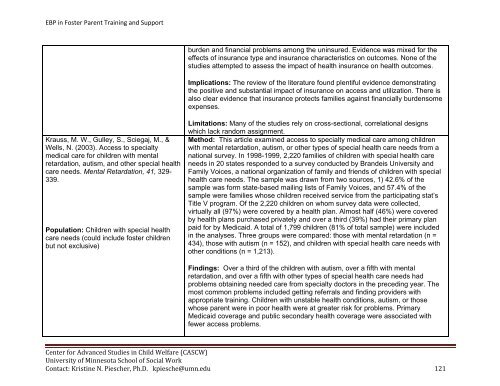Evidence-Based Practice in Foster Parent Training and Support ...
Evidence-Based Practice in Foster Parent Training and Support ...
Evidence-Based Practice in Foster Parent Training and Support ...
You also want an ePaper? Increase the reach of your titles
YUMPU automatically turns print PDFs into web optimized ePapers that Google loves.
EBP <strong>in</strong> <strong>Foster</strong> <strong>Parent</strong> Tra<strong>in</strong><strong>in</strong>g <strong>and</strong> <strong>Support</strong>burden <strong>and</strong> f<strong>in</strong>ancial problems among the un<strong>in</strong>sured. <strong>Evidence</strong> was mixed for theeffects of <strong>in</strong>surance type <strong>and</strong> <strong>in</strong>surance characteristics on outcomes. None of thestudies attempted to assess the impact of health <strong>in</strong>surance on health outcomes.Implications: The review of the literature found plentiful evidence demonstrat<strong>in</strong>gthe positive <strong>and</strong> substantial impact of <strong>in</strong>surance on access <strong>and</strong> utilization. There isalso clear evidence that <strong>in</strong>surance protects families aga<strong>in</strong>st f<strong>in</strong>ancially burdensomeexpenses.Krauss, M. W., Gulley, S., Sciegaj, M., &Wells, N. (2003). Access to specialtymedical care for children with mentalretardation, autism, <strong>and</strong> other special healthcare needs. Mental Retardation, 41, 329-339.Population: Children with special healthcare needs (could <strong>in</strong>clude foster childrenbut not exclusive)Limitations: Many of the studies rely on cross-sectional, correlational designswhich lack r<strong>and</strong>om assignment.Method: This article exam<strong>in</strong>ed access to specialty medical care among childrenwith mental retardation, autism, or other types of special health care needs from anational survey. In 1998-1999, 2,220 families of children with special health careneeds <strong>in</strong> 20 states responded to a survey conducted by Br<strong>and</strong>eis University <strong>and</strong>Family Voices, a national organization of family <strong>and</strong> friends of children with specialhealth care needs. The sample was drawn from two sources, 1) 42.6% of thesample was form state-based mail<strong>in</strong>g lists of Family Voices, <strong>and</strong> 57.4% of thesample were families whose children received service from the participat<strong>in</strong>g stat’sTitle V program. Of the 2,220 children on whom survey data were collected,virtually all (97%) were covered by a health plan. Almost half (46%) were coveredby health plans purchased privately <strong>and</strong> over a third (39%) had their primary planpaid for by Medicaid. A total of 1,799 children (81% of total sample) were <strong>in</strong>cluded<strong>in</strong> the analyses. Three groups were compared: those with mental retardation (n =434), those with autism (n = 152), <strong>and</strong> children with special health care needs withother conditions (n = 1,213).F<strong>in</strong>d<strong>in</strong>gs: Over a third of the children with autism, over a fifth with mentalretardation, <strong>and</strong> over a fifth with other types of special health care needs hadproblems obta<strong>in</strong><strong>in</strong>g needed care from specialty doctors <strong>in</strong> the preced<strong>in</strong>g year. Themost common problems <strong>in</strong>cluded gett<strong>in</strong>g referrals <strong>and</strong> f<strong>in</strong>d<strong>in</strong>g providers withappropriate tra<strong>in</strong><strong>in</strong>g. Children with unstable health conditions, autism, or thosewhose parent were <strong>in</strong> poor health were at greater risk for problems. PrimaryMedicaid coverage <strong>and</strong> public secondary health coverage were associated withfewer access problems.Center for Advanced Studies <strong>in</strong> Child Welfare (CASCW)University of M<strong>in</strong>nesota School of Social WorkContact: Krist<strong>in</strong>e N. Piescher, Ph.D. kpiesche@umn.edu 121
















